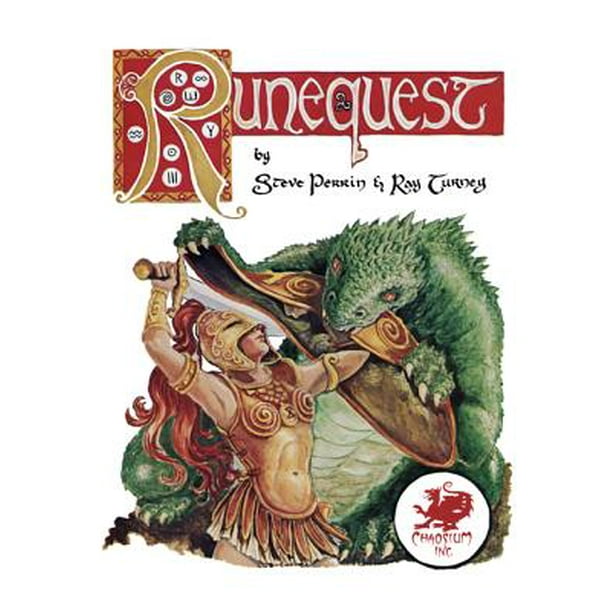
(Following from this post.)
Savvy readers will notice that the big thing I'm looking for to define a Game is the presence of a core gameplay premise that is separate and distinct from the D&D model, with an entire manual of play procedures built around that fact, while remaining a proper wargame.
Thus it should come to no one's surprise that I identify Runequest as one such model. With its well-known Setting Bible, Glorantha, as the in-house example this model is a model where culture and mythology has concrete effects upon campaign play in a way that D&D does not. This Game has several famous Brands of its own, to be named below
Nonetheless, this remains a wargame--as any honest observor of history will show the observer--at its core. Conflicts between the heroes of cultures have a tendancy to scale, especially once those conflicts are mythologized, so yes mass combat is on the table. The road is different; the destination is the same.
The Model
Character generation starts on a familiar basis with rolling for Ability Scores, but after that rapidly diverges. There are no classes or levels. Interactions are skill-based. Characters are fragile, with more or less fixed Hit Point values; some variations use a Hit Location scheme, and others do not, making combat dangerous most of the time and thus to be avoided unless rigged in one's favor. Leeroy doesn't work here.
Monsters are always dangerous, magic--where it exists--is far more involved due to the emphasis on culture and mythology than D&D, and it is not always player-usable (or desirable if it is), and gaining advantage in combat or warfare is far more about leveraging comparable advantage than raw prowess and endurance. Armor, weapons, magic, terrain, morale, skill- all far more viceral here because the pace of decision is slower (moment-by-moment vs. round-by-round) than D&D. Palladium fans that can get out of their bubble will recognize the influence Runequest had on Palladium's D&D knockoff (and thus on all Palladium games).
Because of the greater emphasis on verisimilitude, cultural influence, and mythology as being real and present in mechanical terms (as well as a more involved and fiddly procedure for character generation and improvement), Runequest produces a play experience that feels a lot more like reading the accounts of the Ancients (either their own mythologies, or the historical accounts of Ancient writers). At least, when the Ducks aren't around it does.
The result is that, while characters can and do go on adventures and can (and do) rise to positions of power and authority (with all the Faction Play that goes on), how that goes down and why is significantly different. It is as if someone played D&D and then Traveller and said "Hold on, there's a viable game between the two here" and made it. You can also see what some of the Exalted folks wanted from play in this game.
The Pillars
Rules As Written: Solid work. While it does implicitly assume that you're just running around as your man most of the time, scaling up is not that hard and without even looking you can adapt 1:X scaling principle for mass combat and have it work without issue. You do not need a separate mass combat system.
Strict Timekeeping: Once you get multiple Referees and parties, you want this in place and Runequest does nothing to inhibit it- and, like D&D and Traveller, benefits greatly from doing so. As almost all forms of character improvement has to be done via Mandatory Downtime, be it skills or gear or powers (or recovery), you might as well implement it right away.
Always On: The game comes alive under this practice just like for D&D and Traveller, especially if you implement Faction Play from the start to get the action going.
Faction Play: Kings, priests, demigods, etc. are all major players in a campaign and Runequest emphasizes the importance of these figures. Put them all in player hands right away and let them do the driving. Just like D&D, you will see them take the campaign places you would never have considered; it is on you, however, to brief them fully on the boundaries for their actions.
Brands
Many well-known games are Brand reskins and variations of this Game.
- Pendragon (and its Brands, Prince Valiant and Paladin)
- Stormbringer/Elric!
- Call of Cthulhu
- Burning Wheel (partial, sharing with Traveller) and its Brand Mouseguard
- TORG (Shatterzone)
- The World of Darkness/Age of Sorrows product lines (and Street Fighter)
There's also a lot of also-ran Brands, many of which maintain the core structure while swapping out specific mechical elements. I am not going to try listing them.
The Brands vary wildly in the execution, mostly for the worse (some very much for the worse), because they didn't realize what they were adapting or drawing from or they didn't comprehend how the machine they're using worked- akin to someone making their own auto-loading pistol without knowing how something like a Glock works, creating the game version of a Khyber Pass Copy (itself a suitable comparison to Conventional RPGs).
Those low-quality Brands are insults to Runequest, which is a fantastic Game and deserves to stick around, and the high-quality Brands (e.g. Pendragon) are fully deserving of the praise that they get, because they deliver a particular fantastic adventure wargame campaign experience that no other Game does.
No comments:
Post a Comment
Anonymous comments are banned. Pick a name, and "Unknown" (et. al.) doesn't count.